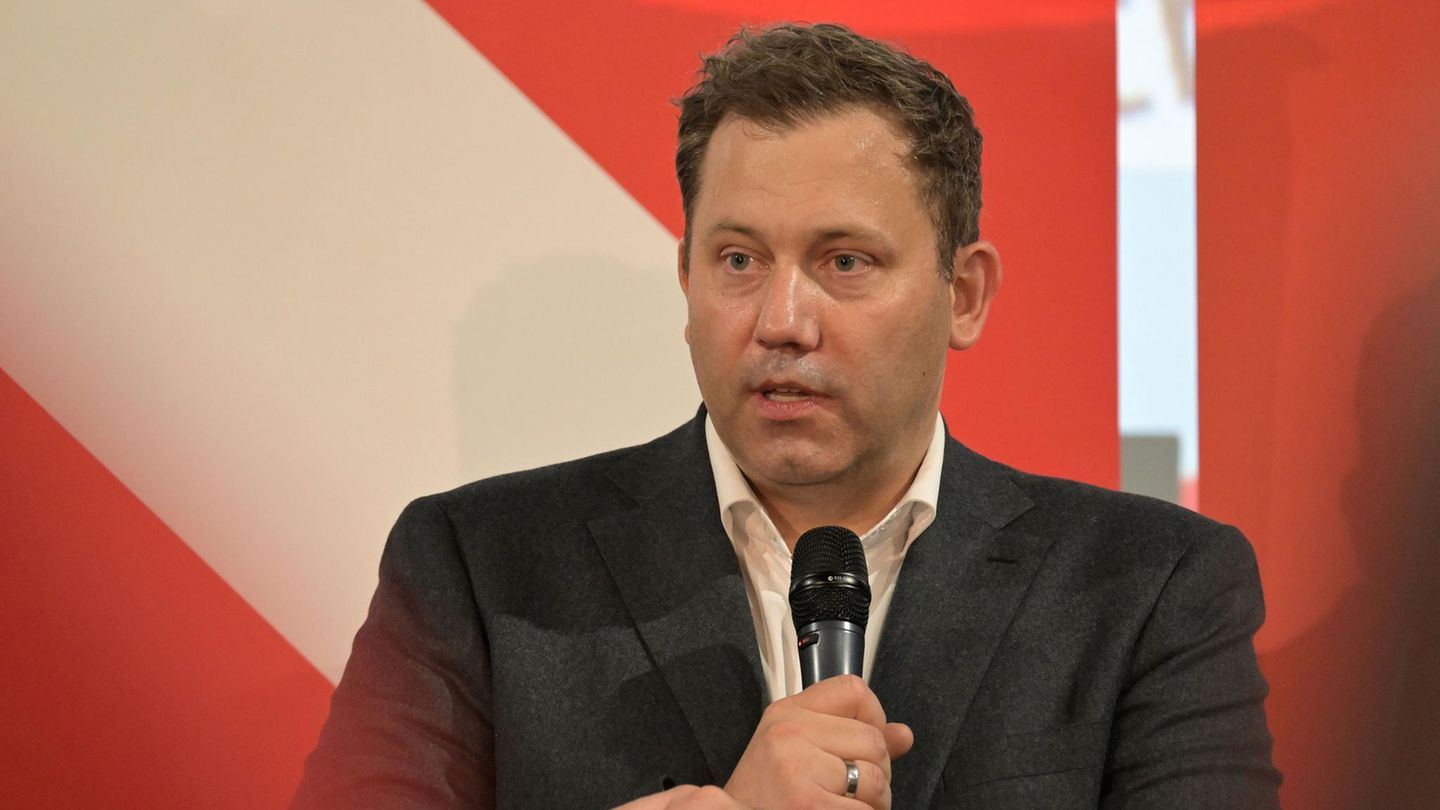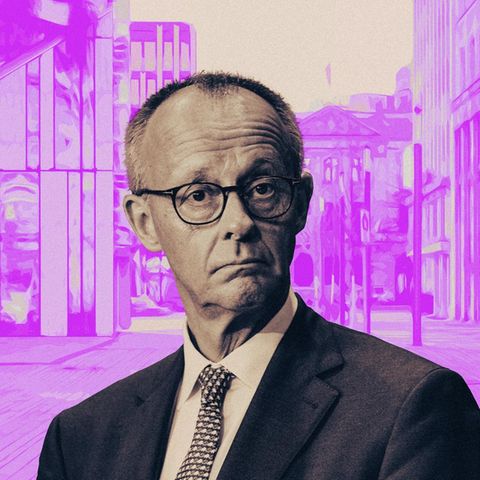Citizen talk
Klingbeil admonishes the Chancellor – and gets “very specific” with the AfD
Copy the current link
Add to watchlist
The “cityscape” controversy follows Lars Klingbeil to Brandenburg. A debate has already been opened here that is gaining momentum in the SPD: How to deal with the AfD?
Lars Klingbeil wants to start off with “a few thoughts”. He dedicates one of these thoughts to a debate that has already fully affected his coalition partner – and could now spill over to his party: How to deal with the AfD?
“We can always talk about the fact that this is a right-wing extremist party; that it spreads hatred and incitement,” says Klingbeil. “But specifically they are against you getting 41 million more.”
That’s how much flows into the city of Brandenburg alone from Klingbeil’s pot of special billions, some of which are also supposed to flow into municipalities and states. And there is a party that voted against these measures, emphasizes Klingbeil, and: “That is the AfD.”
Wednesday evening, the SPD party leader, vice chancellor and finance minister is in Brandenburg an der Havel for the citizens’ dialogue. In the state elections in September 2024, the SPD was able to leave the right-wing populists behind, with Prime Minister Dietmar Woidke finishing first with a wafer-thin lead of 1.7 percentage points. The AfD is now well ahead in surveys with well over 30 percent.
Klingbeil now wants to be “very specific,” apparently his slogan, in order to bring down the right-wing populists. But is that enough? This question has now also affected parts of the SPD. At the Union, it was recently discussed a little too concretely for the taste of many comrades.
Lars Klingbeil: “far too general”
Well-known Christian Democrats had thought so loudly about ways beyond the “firewall” that party leader and Chancellor Friedrich Merz felt forced to make a tough rejection. But on the one hand, this discussion didn’t end there. And on the other hand, the Chancellor immediately opened a new one. His controversial “cityscape” statements have given new fuel to the already existing mistrust of many Social Democrats. This distrust revolves around the question of how stable black people are.
Klingbeil quickly feels this this evening on the Havel. A citizen asks the SPD leader whether the issue needs to be approached more aggressively, i.e. to acknowledge that the cityscape has actually changed and that there are places where young women no longer go in the evenings. Isn’t this a way to avoid arguments from those who exploit the issue?
“The topic is simply much more nuanced than is sometimes presented in the discourse,” answers Klingbeil. Of course there are problems in inner cities and other places that need to be talked about. But he wants to offer solutions, such as strengthening the police. The question is not what last name you have. “The question is: Do you follow the rules?” Klingbeil says he doesn’t believe in “the mixing of migration and security debates”; that’s “much too general” for him.
At almost the same time, the Chancellor appeared before the press in London. Actually it’s about the talks he had at the Western Balkans summit, but what remains is the message: . The controversy surrounding his statements had apparently become too great. Merz emphasizes that immigration will also be needed in the future. But for the first time he also said specifically what bothered him about the public image of German cities: migrants without residence rights and jobs who do not adhere to the rules that apply in Germany. That is unlikely to pacify the controversy that has long since gripped the coalition. Quite the opposite.
Klingbeil cannot know anything about this at the citizen dialogue. He also says that he would never accuse the Chancellor of anything bad – they know each other well and talk a lot. But as SPD chairman, he has a clear opinion: “We have to be careful that we don’t lose people at this point.” At this point, Klingbeil does not repeat a sentence that he had said a few hours earlier at the IG BCE trade union congress in Hanover: “I want to live in a country where appearance does not determine whether you fit into the cityscape or not.”
That was a demarcation from the Chancellor, and also a warning. Of course, this is not a strategy. What Klingbeil does not explain in more detail is how the rules that everyone must adhere to would be implemented “very clearly and consistently” in order to be able to deprive the AfD of its breeding ground.
AfD debate in the SPD
And because, from a purely political perspective, that’s what it’s always about in the end, the SPD is now also having an AfD debate. It was opened on Monday, here in Brandenburg, of all places, by Prime Minister Dietmar Woidke himself. His motto, to put it bluntly: He would cooperate with the AfD at any time – after they have thrown everyone who despises the state and democracy out of the party, an easy task. His SPD general secretary immediately followed up. “The time in which the AfD was ignored or treated with a certain moral superiority from above certainly did us harm,” Kurt Fischer told the news platform “Pioneer.” “You can no longer reach people if you just say: This is hatred and incitement.”
Not everyone in the SPD likes that. The Thuringian SPD Interior Minister Georg Maier dismissed Fischer’s statement as an “individual opinion.” There is no debate in the SPD about changing the way it deals with the AfD. Obviously yes. Because Maier himself has long been looking for new ways – and is obviously relying on a frontal attack.
Not only does he reiterate his call for a ban on the AfD every few days, he recently accused the AfD of abusing its parliamentary right to ask questions to “specifically investigate our critical infrastructure.” The provocation worked. The Thuringian AfD state leader Björn Höcke called for Maier’s dismissal.
So how do you deal with the AfD? Party leader Lars Klingbeil will be judged by how the super election year 2026 goes for the SPD. The AfD is a decisive factor in this, especially in East Germany, where two state elections are imminent – and the AfD is far and away leading the polls. It has already wrested the workers, its core clientele, from the Social Democrats.
After almost two hours, Klingbeil wants to end on a positive note. So far, he says, he hasn’t met a country where he would rather live than Germany. That doesn’t mean that there aren’t problems. But: “We won’t be able to solve it with hatred, agitation and a bad mood.”
He doesn’t mention the AfD by name; it’s so clear who he’s talking about.
Source: Stern
I have been working in the news industry for over 6 years, first as a reporter and now as an editor. I have covered politics extensively, and my work has appeared in major newspapers and online news outlets around the world. In addition to my writing, I also contribute regularly to 24 Hours World.





